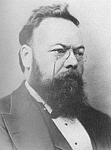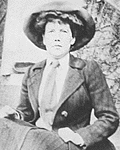The Ivy Compton-Burnett Home Page
Ivy on . . .
everything from
age to wild horses
Interviews
Ivy speaks!
Critics on Ivy Compton-Burnett
Introduction to
Manservant and Maidservant
Some of the people in her life:
• Elizabeth Bowen
• Anthony Compton-Burnett
• James Compton Burnett
• Juliet (Judy) Compton-Burnett
• Nancy Cunard
• Victor Gollancz
• Graham Greene
• Margaret Jourdain
• James Lees-Milne
• Rosamond Lehmann
• Rose Macaulay
• Virginia Woolf
Author; friend of Ivy Compton-Burnett In the reviews she wrote of Ivy's work, Bowen noted that Ivy was "not merely copying but actually continuing the Victorian novel" and "Miss Compton-Burnett, as ever, makes few concessions; she has not, like some of our writers, been scared or moralised into attempting to converge on the 'real' in life. But possibly life has converged on her." At a literary party Bowen was heard to complain mysteriously, "It's really too bad of Cyril [Connolly] to say that Ivy is the only one of us all that will live." "People are always writing to tell her about the death of their hearts," said Ivy sarcastically when Bowen's The Death of the Heart proved yet another of Gollancz's bestsellers. "I suppose her publisher sends her peaches." Ivy, who was also published by Gollancz, had always wanted to write a bestseller, but never did. Bowen seems to have dropped out of Ivy's life after 1951. aka Tolly Burnett Distinguished amateur cricketer; Ivy Compton-Burnett's second cousin once removed. Anthony Compton-Burnett inherited the copyrights to Ivy's novels. Cricket career of Anthony Compton-Burnett Homeopathy Online has posted a Historian's Corner sidebar about Dr. James Compton Burnett, including a photo and a reproduction of the cover of one of his books. (You'll need to scroll down the page a bit to get to the sidebar.) Elsewhere on the page are his views on vaccination. Compton Burnett fathered thirteen children, twelve of whom lived to maturity. But none of his children produced offspring of their own. One of his children died of pneumonia, another was killed in World War I, and three committed suicide. Two of his sons had brief, childless marriages. His eight daughters never married. Books by James Compton Burnett Ivy Compton-Burnett's sister. She translated
Man as Symphony of the Creative Word by Rudolf Steiner. Poet; publisher; rebel; activist Ivy Compton-Burnett and Nancy Cunard shared a devoted friend, the interior decorator Herman Schrijver. Nancy would tell Herman, "Please, darling, please; no Compton-Burnettry for me" whenever he suggested bringing them together. An admirer of Ivy's, Madge Garland, rashly invited Ivy to a Christmas party at which Nancy Cunard was a rival guest of honor. As recounted in Hilary Spurling's Ivy, The Life of Ivy Compton-Burnett, "'Nancy Cunard decked out in all her corals, with spit curls on her cheeks, together on a sofa with Ivy in black velvet was quite a sight,' [said Madge]. Ivy was mesmerized, Nancy scarcely less so by every detail from the conspicious tea-cosy hairdo to the neat bows on Ivy's black, pointed shoes, and like ships in the night, they passed and parted in silence: 'I don't suppose they exchanged a word all evening,' said Madge. 'The only thing I could do as hostess was go into the kitchen and get drunk.'" Nancy Cunard profile at National Public Radio (NPR) Ivy Compton-Burnett's publisher Ivy constantly harassed Gollancz because her books did not sell as well as she wanted them to, and because he kept allowing her books to go out of print. Gollancz was afraid of her and privately referred to her as "The Compton-Burnett."
Wikipedia entry about Victor Gollancz Novelist When Greene worked at the publishing house Eyre and Spottiswoode, he persuaded Ivy to let his firm republish four of her novels. When publication was delayed, Greene wrote to Ivy to apologize: "You know my own feelings about your work, and that there is no living English novelist whom I would rather publish." Authority on English furniture; author; Ivy's longtime companion Ivy and Margaret lived together for 30 years until Margaret's death in 1951. Although they certainly lived as a couple, their friends were divided on the question of whether or not the relationship was sexual. Ivy referred to herself and Margaret as "neutrals." Wikipedia entry about Margaret Jourdain Historic buildings secretary to the National Trust; author; friend of Ivy Compton-Burnett "Ivy Compton-Burnett ate half a pot of raspberry jam, and I was shocked to see her surreptitiously wipe her sticky fingers upon the cover of my sofa," wrote Lees-Milne in his book Ancestral Voices. "Both she and Margaret [Jourdain] ate like horses. This time Miss C.-B. talk a great deal more than Margaret. Her description of the Poetry Reading and Lady Gerald Wellesley's [drunken] antics was very funny. They are a wicked pair." Author; friend of Ivy Compton-Burnett From a review of Ivy's work that Lehmann wrote in 1937: "In each novel ... good is embodied in the persons of independent, shrewd, rather donnish women past their youth: Nature's spinsters, if not actually unwed: for Miss Compton-Burnett does not believe in marriage. An unambiguous respect is accorded to friendships between such women." Ivy affectionately referred to Macaulay as "the most prominent spinster in England." Macaulay, whose books sold much better than Ivy's, told her, "My books won't live. Yours may, Ivy." Novelist Virginia Woolf's Hogarth Press rejected Ivy Compton-Burnett's third novel Brothers and Sisters, which was later published to great acclaim by Heath Cranton in 1929. Although Woolf later admitted that Hogarth should have published Brothers and Sisters, she said of Compton-Burnett, "There is something bleached about Miss Compton-Burnett: like hair that has never had any colour in it." Ivy's growing fame gave Virginia some sleepless nights: "Dead and disappointing ... No life in it," she wrote in her diary in 1937, contrasting her own reviews for The Years unfavourably with Ivy's for Daughters and Sons: "Much inferior to the bitter truth and intense originality of Miss Compton-Burnett. Now this pain woke me at 4 a.m. and I suffered acutely." For her part, Ivy thought Virginia "a terrible snob" and expressed strong reservations about her novels. Malcolm Ingram's Virginia Woolf's Psychiatric History projectElizabeth Bowen (1899-1973)
Anthony Compton-Burnett (1923-1993)
James Compton Burnett (1840-1901)
 Ivy Compton-Burnett's father; homeopathic doctor; author.
Ivy Compton-Burnett's father; homeopathic doctor; author.
Juliet (Judy) Compton-Burnett (1893-?)
Nancy Cunard
Victor Gollancz (1893-1967)

Graham Greene (1904-1991)
Margaret Jourdain

James Lees-Milne
Rosamond Lehmann (1901-1990)
Rose Macaulay (1881-1958)
 Author; friend of Ivy Compton-Burnett
Author; friend of Ivy Compton-Burnett
Virginia Woolf (1882-1941)